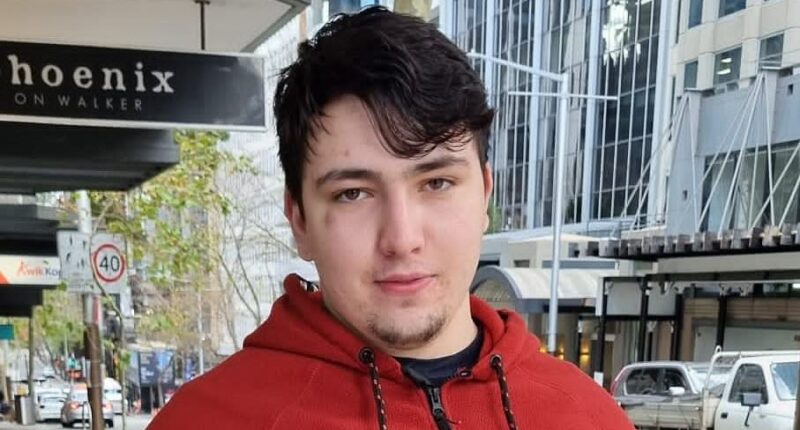It was the lowest point of Daniel Vincent’s life.
Staring at the empty page of his journal, he trembled as he wrote: ‘What’s the purpose of existence if I can never achieve my potential? It might be better to end my life.’
Heartbreaking words for someone so young. At just 18 years old, Daniel had lost all hope. The light had gone out.
‘I needed to kill myself, or fix my life. My journal entry was my absolute rock bottom,’ he tells me.
Daniel, a teenager from the eastern suburbs of Sydney, was supposed to be enjoying life to the fullest, yet he had become a virtual recluse. He had transitioned from being a sports enthusiast in school to a recluse battling chronic pain, with two shoulder injuries, severe joint pain, and compartment syndrome in his left foot, which had shattered his promising soccer career.
‘Every visit to the medical professionals resulted in another batch of medications. No one could offer me assistance, and it felt like pills were the only solution presented to me,’ remarks Daniel.
‘One doctor told me I would have to live in this chronic state for life, that there was no solution to my pain except pills.
‘I felt like a 90-year-old man, not an 18-year-old teenager.’

At the age of 18, Daniel felt ‘like a 90 year old man, not a teenager’. Suffering with ADHD, chronic pain and depression, he comfort-ate until he weighed 125kg (276lbs)
Daniel was suicidal and began to comfort eat to mask his depression. Eating five pizzas in one day wasn’t unusual for him, and soon the scales tipped at 125kg (276lbs or almost 20st), which was hefty for his 180cm (5’11) height.
‘I used to be the sporty kid, I lived on protein powders, ate a pretty standard diet of pasta and veggies, and was in the gym most days, until I tore my labrum in both shoulders working out,’ he says
‘I woke up in pain and went to bed in pain, and instead of playing soccer on the field, I stayed inside my bedroom playing FIFA instead.’
Daniel also suffered acne, with red and tender bumps covering his entire face.
Doctors prescribed Accutane, a prescription-only retinoid, yet it came with one debilitating side effect that only compounded Daniel’s agony: joint pain.
To add to his medical issues, Daniel had been diagnosed with ADHD and depression, and was taking the antidepressant Lexapro, as well as Ritalin and strong painkillers daily.
Daniel says taking ADHD meds was ‘like putting glasses on for the first time’ and the stimulant medication did help him focus in short bursts.
However, the effects wore off every six hours and he kept having to ‘top them up’ and increase his dose to avoid crashing.

Daniel had dreams of being a physio but while he got the grades, his poor health held him back. While is friends were enjoying life, he was binging on junk food and playing video games
‘I was sub-human without them. I had dreams of being a physio, and while I got the grades, my mental and physical health was declining,’ he says.
‘The person I was was stripped away. I finished school, took a gap year, and instead of going out with mates, celebrating and enjoying life, I was binging on junk food and playing video games.
‘I just couldn’t see a way out. I felt like a failure and wanted to throw the towel in. I felt killing myself was the only answer. I paid doctors thousands over the years, yet no one could help me.’
Then Daniel decided to take matters into his own hands and, in his words, ‘dived into a rabbit warren’. He spent hours on the computer, researching natural cures for ADHD, depression and chronic pain.
‘My pain was my driving force. While I was up at night crying in pain, it drove me to find a cure. I knew I couldn’t live like this forever.’
After watching endless YouTube videos, the same thing kept coming up: the carnivore diet.
‘It was like a lightbulb moment, and I realised what I ate was actually making things worse for me.’
Eventually Daniel found a sports doctor who asked him a question he had never been asked before by a medical professional: ‘What is your diet like?’

At his heaviest, Daniel weighed 125kg. He could barely walk 1,000 steps because of his pain
It was the first sign of hope for Daniel, then 19. ‘I knew straight away I could trust this doctor. He recommended a low insulin diet, high protein and low carbs.
‘I basically started eating a lot more meat, and completely cut out vegetables, which never agreed with me. I swapped coffee for bone broth and pasta for rib eye.’
During the first week, Daniel admits he felt terrible. ‘My body didn’t know what had hit it,’ he says.
But by week two, Daniel got out of bed in the morning without any pain anywhere is his body for the first time in more than three years.
‘I couldn’t believe it,’ he admits.
‘The pain in my foot had completely disappeared. My shoulders had improved. I had more energy. I started to walk almost 10km a day instead of struggling with 1,000 steps. And all I had done was change my diet.
‘Food had been my comfort source, running away from my awful life. But with my change in diet, my life started to become worth living again.’
The weight melted off him, and within four months, he had lost 44kg (97lbs), taking his weight down to a healthier – and happier – 81kg (178lbs).
After a few months of eating meat for every meal, something incredible happened to Daniel: he felt so good that he came off all his drugs, including Ritalin for his ADHD.
‘I felt like a superhuman. I came off Lexapro, I had unlimited energy, I was flying 24/7, I felt so sharp and alive again,’ he says.
‘I eat meat twice a day, with eggs, and that’s pretty much it. I won’t eat vegetables – I don’t consider them food and they bloat me and hurt my gut. I don’t believe they have nutrients in them with all the processes they are put through.

In desperation, Daniel spent hours researching and eventually came across the carnivore diet. Switching pasta and ice cream for meat and eggs eliminated his symptoms in just weeks
‘Certain people have more tolerance to veg, legumes and nuts and my body didn’t tolerate [them] very well.
‘My skin cleared up, my ADHD has disappeared and my blood levels, which are tested regularly, are perfect.’
While he advises people to get opinions from doctors and medical professionals, he maintains it was his diet he believes that ‘cured’ him of his depression and ADHD.
Now 21, Daniel owns his own home-maintenance business and has recently moved into his own apartment in the eastern suburbs of Sydney.
And, for the first time in years, he is pain free. He credits this to following the carnivore diet for three years. His girlfriend is carnivore, too.
Dr Avi Charlton, a GP and advocate for the low-carbohydrate diet, says Daniel’s transformation makes total sense.
‘If he had previously eaten a standard diet that was high in processed foods, refined carbohydrates and inflammatory oils, that could have contributed to chronic inflammation, poor mitochondrial function and inadequate brain fuel,’ Dr Charlton says.
‘Switching to a carnivore diet means he’s now consuming a far more nutrient-dense way of eating, rich in bioavailable vitamins and minerals that support overall health.’
Dr Charlton says there’s increasing evidence that mental health conditions are worsened by inflammation, and the carnivore diet has been proved to be anti-inflammatory.
‘The high-quality fats in animal foods, especially omega-3s and saturated fats, provide the brain with the essential fuel it needs to function optimally.

Now Daniel can work out again, he feels ‘superhuman’. He has his own business and apartment in Sydney’s eastern suburbs, and his girlfriend is carnivore too
‘Additionally, by reducing carbohydrates significantly, his body would have increased ketone production, which is known to reduce neuroinflammation and serve as a more efficient energy source for the brain than glucose.
‘This could explain why he’s seeing such improvements in his ADHD and mood symptoms.
‘While this approach is clearly working well for him, it’s always important to ensure long-term nutritional adequacy and monitor any potential deficiencies. But overall, his experience highlights just how powerful dietary changes can be for brain health and mental well-being.’
But Stephanie Sandor, a vegan nutritionist, warns against banning all plant foods, saying you risk missing out on vital nutrients.
‘Don’t be fooled by anecdotes that talk about extreme measures improving their health,’ Sandor says.
‘Animal products contain no fibre. Fibre is needed for a healthy gut to ensure healthy bowel movements, help prevent bowel cancer, one of the most common cancers in Australia, and to help produce neurotransmitters for health mood regulation such as dopamine.
‘Perhaps in this Daniel’s case, his “elimination” carnivore diet, also helped remove some junk foods that were affecting his gut health?’
Stephanie goes on to say that most Australians aren’t getting the recommended dose of magnesium a day (400mg daily), found in leafy green vegetables and whole grains.
‘At the end of the day, the carnivore diet is a restrictive diet, and an unhealthy one at that.’
Daniel has launched his own Instagram account @carnivorevitality and has a message to young men who are struggling:
‘You may feel the world has failed you but the body was designed to heal, you were designed to be healthy. Believe in your body, whatever any doctor tells you, you must have arrogance in yourself, refuse to live a life of mediocrity. I could have lived in chronic pain all my life, I said no, that’s not going to be my life.’
If you plan on making any major dietary or health changes, it’s important to consult a GP for medical advice beforehand.

















